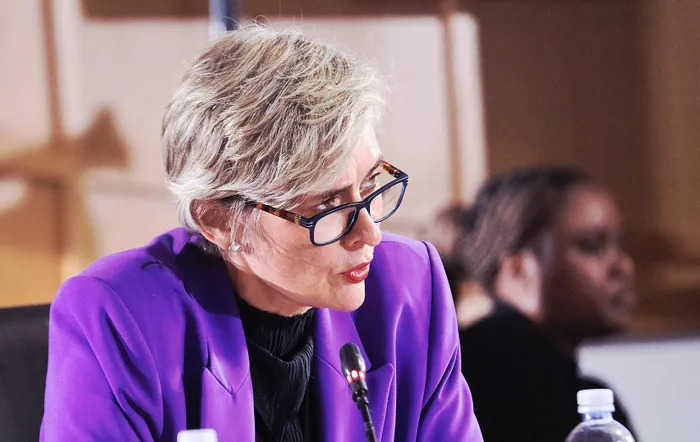This is how Mchunu, Sibiya defied odds to protect criminals - SAPS expert explained | Madlanga Commission

SAPS expert, Maj. Gen. Patronella Van Rooyen testify at the Madlanga commission in Pretoria.
Image: Timothy Bernard
SAPS expert, Major General Patronella Van Rooyen painted a damning picture of betrayal, accusing Police Minister Senzo Mchunu and SAPS Deputy National Commissioner Shadrack Sibiya of defying legal boundaries to protect criminal elements.
Van Rooyen did not mince her words during her testimony before the Madlanga Commission on Thursday.
In a detailed breakdown of SAPS command structures and legal mandates, she warned the commission that what is unfolding was not a matter of bureaucratic misunderstanding — but one that edges dangerously close to compromising national security.
She told the commission to dwell on the matter at hand instead of “policy” and “directives”.
Van Rooyen’s testimony was the assertion that Mchunu had acted far beyond the legal scope of his office.
According to the SAPS Act, the police minister may set policy, but operational decisions — including the existence of task teams like the Political Killings Task Team (PKTT) — fall under the purview of the National Commissioner.
Despite this, Mchunu pressured National Commissioner Fannie Masemola to dissolve the PKTT — a move Van Rooyen said he had no authority to make.
“And the decision of the minister to close a political task team that was responsible for the investigation of crime, in my view, fell outside the mandate or authority of the minister,” she said, according to Section 207 of the Constitution.
This was further corroborated by Masemola himself in his testimony last week.
He told the commission that Mchunu had claimed President Cyril Ramaphosa supported the dissolution of the PKTT.
This was a claim Masemola later said raised concerns because Ramaphosa was taken aback by it.
Before that, Masemola approached Ramaphosa about the disbandment of the task team and he said he would talk to Mchunu and revert.
That conversation never materialised.
Van Rooyen also called out Deputy National Commissioner Shadrack Sibiya, stating he overstepped his role by taking instructions directly from Mchunu.
According to SAPS protocol, Sibiya should report to the National Commissioner — not act on ministerial directives.
“Sibiya has no legal authority to act on the minister’s instruction independently. This is a clear breakdown of command, and more dangerously, a breach of institutional integrity,” Van Rooyen stated.
Van Rooyen’s testimony has intensified allegations that both Mchunu and Sibiya may have colluded with criminal networks to undermine efforts to combat politically motivated killings in South Africa — a national crisis that the PKTT was specifically created to address.
The expert hinted that the timing and rationale behind the task team's disbandment align suspiciously with attempts to derail investigations into high-profile political murders.
Last week, Masemola revealed that a whistleblower warned that Sibiya had a close and possibly compromising relationship with the controversial businessman, Vusimuzi “Cat” Matlala.
Matlala is also accused of kidnapping prominent businessman Jerry Boshoga and is also implicated in a slew of charges including attempted murder, conspiracy to commit murder, and money laundering.
Masemola also revealed that Mchunu was angry after being aware that the PKTT was making progress in linking suspects to murder cases despite his rush to disband the squad.
Van Rooyen warned South Africa may be witnessing an erosion of law enforcement independence.
As the Madlanga Commission continues its hearings, eyes across the nation are locked on what may be one of the most serious accountability tests yet for the Ramaphosa administration.
IOL Politics